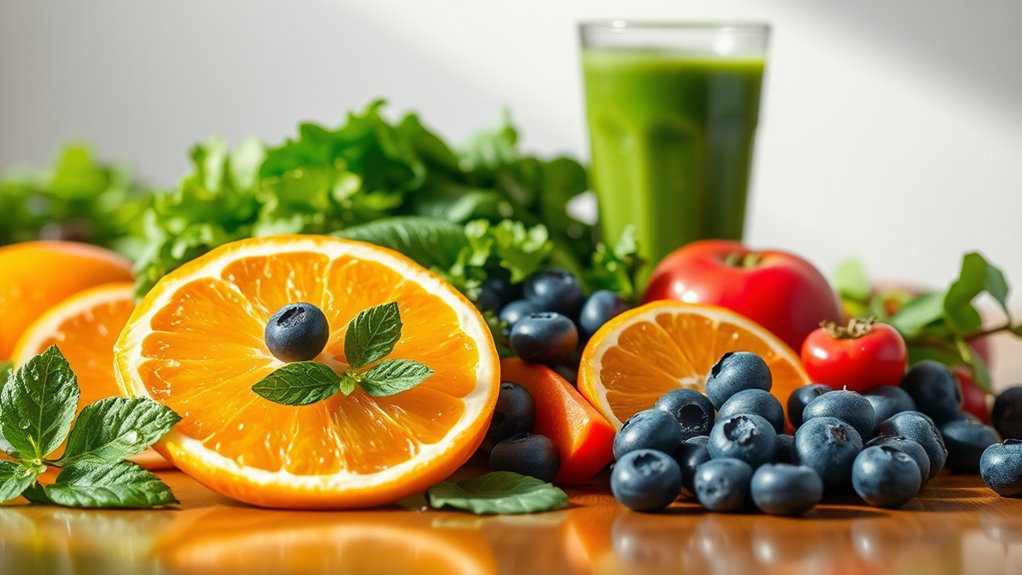Can Food Really Clear Your Skin. Here’s the Science
Yes, food can greatly impact your skin health. Antioxidant-rich foods like berries and leafy greens protect your skin, while healthy fats from avocados boost moisture and elasticity. However, certain foods, like dairy and sugary treats, may increase acne and inflammation. Staying hydrated flushes out toxins, enhancing your skin’s radiance. By choosing the right foods, you can promote clearer skin. Discover more about how to build a skin-friendly diet and specific nutrients that can help you.
Understanding the Skin-Food Connection
The connection between what you eat and the health of your skin is more significant than many people realize. Certain foods for clear skin can help reduce inflammation, fight acne, and promote an even complexion.
Incorporating fruits like berries, rich in antioxidants, can protect your skin from damage. Leafy greens, packed with vitamins, support skin repair. Healthy fats from avocados and nuts maintain moisture and elasticity.
Additionally, staying hydrated by drinking plenty of water flushes out toxins, giving your skin a radiant glow. Consuming antioxidant-rich foods can also enhance skin appearance and regeneration by neutralizing free radicals that cause damage.
Key Nutrients for Healthy Skin
Here are some important ones to include:
- Vitamin C: Boosts collagen production and helps repair skin.
- Vitamin E: Acts as an antioxidant, protecting skin from damage.
- Omega-3 fatty acids: Reduces inflammation and keeps skin hydrated.
- Zinc: Aids in healing and supports skin structure.
- Biotin: Essential for skin health and may prevent dryness.
In addition to these nutrients, maintaining a balanced diet with anti-inflammatory foods can further promote clearer skin.
Foods That May Contribute to Acne
While focusing on key nutrients can greatly benefit your skin, it’s equally important to recognize foods that might trigger acne. Certain dietary choices can exacerbate breakouts, so consider modifying your intake. Here’s a quick overview of common culprits:
| Food Type | Impact on Skin |
|---|---|
| Dairy Products | May increase hormones linked to acne |
| Sugary Foods | Can spike insulin, leading to inflammation |
| Refined Carbs | Often linked to higher acne rates |
In addition to these factors, dietary choices can play a significant role in overall skin health.
The Role of Inflammation in Skin Health
Inflammation plays an essential role in your skin’s health, as it can lead to various skin issues, including acne and irritation.
When your body responds to stressors, it can trigger inflammation, causing skin cells to become imbalanced. This is because psychological stress can initiate physiological responses that exacerbate skin conditions.
To manage inflammation and support your skin, consider these tips:
- Stay hydrated to flush out toxins.
- Incorporate antioxidants to combat free radicals.
- Get enough sleep to allow for skin repair.
- Manage stress through mindfulness or exercise.
- Avoid excessive sun exposure to prevent inflammation.
Building a Skin-Friendly Diet
Understanding the link between what you eat and your skin’s appearance can greatly impact your overall skin health. To build a skin-friendly diet, focus on incorporating antioxidant-rich fruits and vegetables, like berries and leafy greens, which combat oxidative stress. Omega-3 fatty acids, found in fish and flaxseeds, can reduce inflammation, while whole grains promote balanced blood sugar levels. Stay hydrated with water to maintain skin elasticity, as proper hydration is essential for skin’s health. Limit processed foods, sugar, and dairy, as they may exacerbate skin issues for some individuals.

